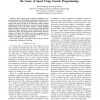601 search results - page 1 / 121 » Playing large games using simple strategies |
SIGECOM
2003
ACM
13 years 9 months ago
2003
ACM
We prove the existence of -Nash equilibrium strategies with support logarithmic in the number of pure strategies. We also show that the payoffs to all players in any (exact) Nash...
CIG
2006
IEEE
13 years 10 months ago
2006
IEEE
Abstract— Many games require opponent modelling for optimal performance. The implicit learning and adaptive nature of evolutionary computation techniques offer a natural way to d...
CONCUR
2005
Springer
13 years 10 months ago
2005
Springer
Abstract. Reactive systems are often modelled as two person antagonistic games where one player represents the system while his adversary represents the environment. Undoubtedly, t...
GECCO
2007
Springer
13 years 10 months ago
2007
Springer
Opponent models are necessary in games where the game state is only partially known to the player, since the player must infer the state of the game based on the opponent’s acti...
CIAC
2010
Springer
13 years 8 months ago
2010
Springer
The study of simple stochastic games (SSGs) was initiated by Condon for analyzing the computational power of randomized space-bounded alternating Turing machines. The game is play...



